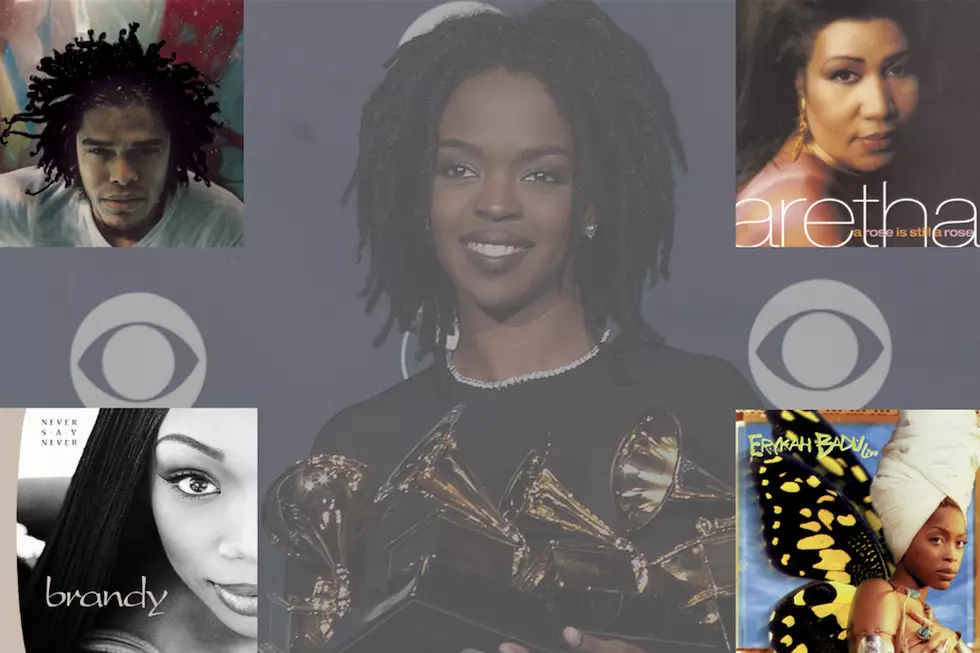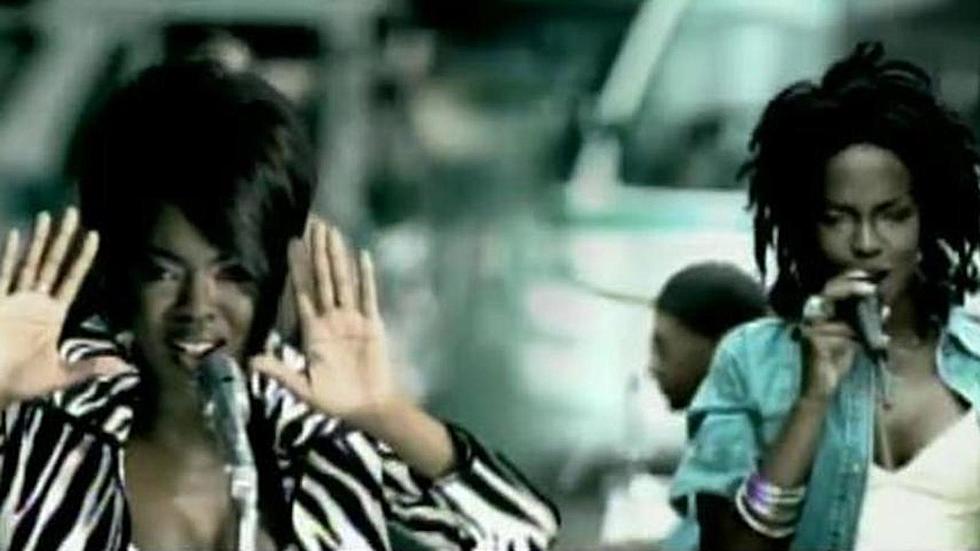
Ranking The Album: ‘The Miseducation of Lauryn Hill’
In the pantheon of music, there are a select list of albums that have had the type of cultural impact that constitutes them as being hailed among the most important and groundbreaking bodies of work. The Miseducation of Lauryn Hill, rapper/singer Lauryn Hill's 1998 solo debut, is one of those albums and has only grown in legend with the passage of time, with many listeners and critics alike ranking it as the greatest rap album from a female of all-time.
Just two years prior to the release of her debut, Lauryn Hill was on top of the world, as her rap group, the Fugees, had shocked the music world with their breakthrough sophomore album, The Score, which would produce the smash singles "Killing Me Softly," "Fu-Gee-La," and "Ready or Not," all of which would prominently showcase Hill's talent and charismatic flair. The Score would go on to sell over 16 million copies worldwide, making it one of the most successful rap albums of all-time and turn the Fugees into critical darlings and international superstars.
However, trouble would arrive in paradise in the form of the growing rift between Fugee brainchild Wyclef Jean and Lauryn Hill, who had been romantically involved with one another during their tenure as group-mates. The drama would ultimately spill over and cause the trio to go their separate ways, with many wondering what would be the next move for Lauryn Hill, who had emerged as the group's most popular member at their peak. With Wyclef being credited as the creative genius of the group and his own solo debut, The Carnival, being a massive success, it was imperative to Lauryn Hill that her solo album would earn her her just due as a creative and visionary in her own right and serve as evidence that she was more than capable of flourishing on her own.
In August of 1998, Lauryn Hill would unveil her highly anticipated debut album, The Miseducation of Lauryn Hill, to widespread critical acclaim and commercial success, peaking at No. 1 on the Billboard 200 with 422,624 copies sold in its first week, breaking a record for first-week sales by a female artist at the time. Led by the chart-topping single "Doo Wop (That Thing)", and the Top-40 hits "Ex-Factor" and "Everything Is Everything," The Miseducation of Lauryn Hill would sell over 12 million copies worldwide and earn Hill ten Grammy nominations at the 41st Annual Grammy Awards in 1999, five of which she won, including Best New Artist, Best R&B Song, Best Female R&B Vocal Performance, and Best R&B Album. The Miseducation of Lauryn Hill would also win the Grammy Award for Album of the Year, become the first rap album in history to receive that honor, making it one of the most decorated rap releases of all-time.
Nineteen years after that historic night on February 24, 1999, The Boombox commemorates the classic that is The Miseducation of Lauryn Hill by ranking the album from worst-to-first. Where does your favorite track rank?
- 14
"Every Ghetto, Every City"
Lauryn Hill"I was just a little girl/Skinny legs, a press and curl/My mother always thought I'd be a star," Lauryn Hill croons on "Every Ghetto, Every City," a selection from her classic debut. Reminiscing on her days as a youth in New Jersey, the form Fugee delivers a solid performance, albeit one that is ultimately pedestrian in comparison to other key inclusions on The Miseducation of Lauryn Hill.
- 13
"Final Hour"
Lauryn HillThe majority of The Miseducation of Lauryn Hill captures Lauryn as a songstress as opposed to an emcee, but one instance in which she reminds listeners of her lyrical guile comes on "Final Hour." "I treat this like my thesis/Well-written topic, broken down into pieces" L-Boogie begins before littering the track with witty couplets and running roughshod over the guitar and horn laden backdrop.
- 12
"Superstar"
Lauryn HillLauryn Hill tackles the topic of the commercialization of hip-hop culture on "Superstar," a track that calls the conduct of high-profile rap stars into question. "Music is supposed to inspire/How come we ain't gettin no higher?" the New Jersey native asks on the songs hook, a sentiment that still remains on certain levels today.
- 11
"Forgive Them Father"
Lauryn HillLauryn Hill warns listeners of the ways of the deceitful and the distrustful on "Forgive Them Father," one of the more lively tunes on The Miseducation of Lauryn Hill. Blending her vocal and lyrical skills, L-Boogie navigates over the percussion and guitars with ease as she begs for mercy on those who may not be aware of their of their own misdeeds.
- 10
"Tell Him"
Lauryn HillThe Miseducation of Lauryn Hill ends on a good note with the album closer "Tell Him," on which the former Fugee gets spiritual as she urges listeners to seek out and speak to a high power. Littered with affirmations, like "Now I may have wisdom and knowledge on Earth/But if I speak wrong then what is it worth," "Tell Him" is among the more humbling moments on Lauryn Hill's debut.
- 9
"The Miseducation of Lauryn Hill"
Lauryn HillSprawling piano keys greet listeners on The Miseducation of Lauryn Hill's title-track, a serene ballad on which the songstress gets introspective while searching for the moment where she lost herself. With lyrics like "And deep in my heart, the answer it was in me/And I made up my mind to define my own destiny," Lauryn Hill's artistic transparency is evident as puts forth one of the more intense selections on her solo debut.
- 8
"When It Hurts so Bad"
Lauryn HillLauryn Hill wallows in heartache on The Miseducation of Lauryn Hill track "When It Hurts so Bad," a string and percussion-powered composition that helps the triple-threat convey her pain and bare her emotional scars. Caught in the whirlwind of an unhealthy relationship that leaves her conflicted, Lauryn Hill puts forth an impassioned vocal performance that tugs on the heartstrings.
- 7
"I Used to Love Him"
Lauryn Hill featuring Mary J. BligeOne of the premier moments on The Miseducation of Lauryn Hill comes in the form of "I Used to Love Him," a collaboration that paired Lauryn Hill with fellow '90s superstar Mary J. Blige during the prime of their respective careers. Speaking from the perspective of a woman fed up, Lauryn and Mary let go of their emotional baggage and move forward with their heads held high and their dignity intact on this album standout.
- 6
"Everything Is Everything
Lauryn HillAmong the more popular songs from The Miseducation of Lauryn Hill is "Everything Is Everything," an upbeat song that captures Hill in a state of optimism. Written by Johari Newton and Hill and produced by the latter, "Everything Is Everything," which was the third and final single released from The Miseducation of Lauryn Hill, would include a contribution from a young John Legend, adding to the track's significance.
- 5
"To Zion"
Lauryn HillLauryn Hill teams up with Carlos Santana on The Miseducation of Lauryn Hill track "To Zion," a song celebrating her newborn son, Zion David, and the impact he's had on her life. One of the more personal tracks on Hill's debut, "To Zion" is powered by slow-rolling percussion and acoustic guitar riffs that set the tone for Lauryn's impassioned performance.
- 4
"Nothing Even Matters"
Lauryn Hill featuring D'AngeloOne of the more indelible moments captured on The Miseducation of Lauryn Hill is "Nothing Even Matters," which pairs Hill with r&b star D'Angelo for a sultry duet for the ages. Despite not being serviced as a single, "Nothing Even Matters" would become a favorite on quiet storm playlists and is regarded as one of the more superb r&b collaborations of its time.
- 3
"Doo Wop (That Thing)"
Lauryn HillIn the summer of 1998, Lauryn Hill unleashed "Doo Wop (That Thing)," the lead single from her debut album, The Miseducation of Lauryn Hill, and her first release since splitting from the Fugees the previous year. Blending her vocals and lyrical talents, Lauryn Hill would cook up a smash that would dominate radio and set the tone for her eventual reign as one of the bigger stars in all of music. Debuting atop the Billboard Hot 100, the 10th song in history to accomplish that feat, "Doo Wop (That Thing)" would be a monstrous success, earning Lauryn Hill too Grammys for Best Female R&B Vocal Performance and Best R&B Song in 1999.
- 2
"Lost Ones"
Lauryn Hill"It's funny how money change a situation," L-Boogie spits on "Lost Ones," the opening salvo on her 1998 debut, The Miseducation of Lauryn Hill. Featuring a sample of Sister Nancy's ubiquitous dance-hall cut "Bam Bam" and additional instrumentation by James Poyser, "Lost Ones" is powered by a rollicking backdrop, over which the former Fugee turned soloist dominates with a trio of verses. Produced by Ché Guevara, Vada Nobles and herself, "Lost Ones" ranks among Lauryn Hill's most memorable rhyme spills and remains an exercise in the art of emceeing, further reason as to her standing as arguably the greatest female rapper of all-time.
- 1
"Ex-Factor"
Lauryn HillReleased as the second single from The Miseducation of Lauryn Hill, "Ex-Factor" would quickly catch on as one of the album's premier ballads and peak at No. 21 on Billboard's Hot 100 chart, continuing her winning streak. Allegedly inspired by her tumultuous relationship with Fugee member Wyclef Jean, "Ex-Factor" finds the talented songstress at her best, strutting over the plush instrumentation with a command all her own. The Miseducation of Lauryn Hill may have produced bigger hits, but twenty years after the fact, "Ex-Factor" remains the album's crown jewel and Lauryn Hill's most captivating vocal performance as soloist.
More From TheBoombox









